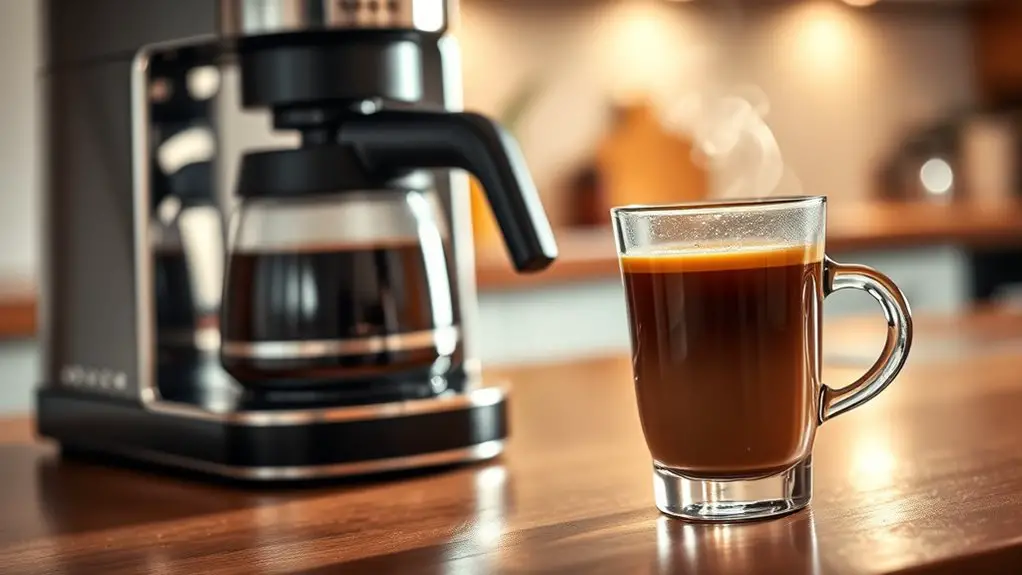When brewing coffee, the quality of your water is essential for achieving the best flavor and aroma. Consider filters like Brita, PUR, or Mavea, which effectively reduce impurities. Activated carbon and reverse osmosis are popular choices for enhancing water quality. Always check for filter compatibility and efficiency ratings. Regular maintenance, including timely filter replacements and cleaning, guarantees peak performance. Want to discover more about maximizing your coffee experience? There's plenty more to explore.
Understanding the Importance of Water Quality in Coffee Brewing
When you consider brewing the perfect cup of coffee, you might overlook one critical factor: water quality. Water hardness plays a pivotal role in the extraction process, affecting flavor and aroma. Hard water, rich in minerals like calcium and magnesium, can lead to over-extraction, resulting in a bitter taste. Conversely, water that's too soft may lack the necessary minerals, leading to under-extraction and a flat flavor profile. Striking the right mineral balance is essential; a well-rounded brew typically requires a moderate level of hardness. To achieve this, you'll want to use filtered water that removes impurities while retaining beneficial minerals. This attention to water quality will elevate your coffee experience, allowing you to savor each cup's true potential.
Types of Water Filters Suitable for Coffee Makers
While you might be focused on the coffee beans themselves, selecting the right water filter for your coffee maker is just as crucial. Here are the primary types of water filters you should consider:
| Filter Type | Description | Pros |
|---|---|---|
| Activated Carbon | Removes chlorine and improves taste | Affordable and effective |
| Reverse Osmosis | Eliminates most impurities | Provides pure water |
| Ion Exchange | Softens hard water by removing calcium and magnesium | Reduces scale buildup |
| Ceramic Filters | Traps bacteria and sediments | Long-lasting and reusable |
Using activated carbon filters can enhance flavor, while reverse osmosis guarantees purity. Choosing the right filter aligns with your quest for the ultimate coffee experience, letting you enjoy every cup freely.
Top Water Filter Brands for Coffee Enthusiasts
Choosing the right water filter can greatly enhance your coffee brewing experience, and understanding which brands excel in this area is key. For coffee enthusiasts, brands like Brita and PUR stand out. Brita offers versatile filters that reduce chlorine taste and odor, ensuring a clean cup. PUR, on the other hand, provides advanced filtration with its activated carbon and ion-exchange technology, perfect for those desiring purity in every sip. Additionally, the Mavea brand is known for its unique filtration system that balances mineral content, catering to discerning palates. Finally, AquaCrest filters are highly regarded for their affordability and effectiveness, making them a popular choice among coffee lovers. Selecting from these top filter brands can greatly elevate your coffee enjoyment.
Key Features to Look for in a Coffee Maker Water Filter
To guarantee a superior brewing experience, it is vital to take into account several key features when selecting a water filter for your coffee maker. First, consider filter efficiency; it should effectively reduce impurities like chlorine, sediment, and minerals that can negatively impact flavor. Look for filters that have been independently tested to verify they meet high standards. Additionally, filter compatibility is important; you want to confirm the filter fits your specific coffee maker model. This not only prevents leaks but also guarantees peak performance. Finally, consider the filter lifespan; longer-lasting filters save you time and money in the long run. By focusing on these features, you'll enhance the quality of your coffee and enjoy a more satisfying brewing experience.
How to Maintain Your Coffee Maker and Water Filter
Understanding how to maintain your coffee maker and water filter is essential for guaranteeing peak performance and longevity. Regular upkeep not only enhances your brew but also extends the life of your equipment. Follow these maintenance tips:
- Clean regularly: Wipe the exterior and wash removable parts with warm, soapy water.
- Descale as needed: Use a descaling solution to remove mineral buildup every few months.
- Filter replacement: Change your water filter according to the manufacturer's recommendations, typically every two months.
- Check water levels: Always guarantee you're using the right amount of water for your brew size.
- Store properly: If you're not using your coffee maker for an extended period, store it in a cool, dry place.
- Regular descaling ensures optimal condition and preserves the flavor of your coffee by preventing mineral buildup.
Frequently Asked Questions
Can I Use Bottled Water Instead of Filters?
While bottled water can be a convenient alternative, its quality and mineral content vary. You'll want to guarantee it complements your coffee's flavor. Filtering may still be your best bet for consistency and taste.
How Often Should I Replace My Water Filter?
You should replace your water filter based on its longevity and usage frequency. Typically, every two to three months works well, but if you notice changes in taste or clarity, consider replacing it sooner.
Do Water Filters Affect Coffee Flavor?
Yes, water filters greatly affect coffee flavor. Proper water quality enhances coffee extraction, ensuring ideal flavor profiles. Using a filter that removes impurities can lead to a cleaner, more enjoyable cup, allowing your coffee's true character to shine.
Are There Specific Filters for Espresso Machines?
Ever wondered how to elevate your espresso experience? Specific espresso machine filters enhance flavor by reducing impurities. These filters provide filtration benefits, ensuring your brew's purity. Investing in the right filter makes a noticeable difference.
Can I Reuse Water Filters After Cleaning Them?
You can reuse water filters after cleaning them, but their filter lifespan may decrease. Employ effective cleaning techniques, like rinsing and soaking, to maximize performance. However, monitor for any signs of wear or reduced efficiency.
